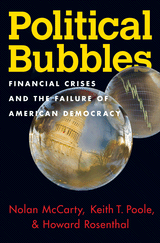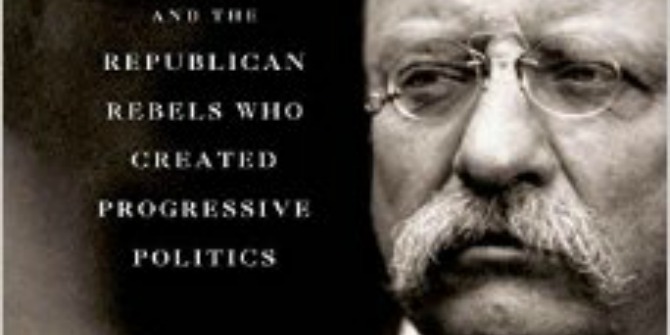Political Bubbles is very enjoyable, insightful, and challenging, writes Declan Jordan. It addresses a remarkably under-analysed aspect of the financial crisis and the interface generally between politics and economics. Some of the political failures that came to the fore for the financial crises are just as likely to hinder political approaches to important problems, including poverty, inequality, and climate change. The analysis and ideas within the book are too important to be considered in a narrow context.
 Political Bubbles: Financial Crises and the Failure of American Democracy. Nolan McCarty, Keith T. Poole and Howard Rosenthal. Princeton University Press. May 2013.
Political Bubbles: Financial Crises and the Failure of American Democracy. Nolan McCarty, Keith T. Poole and Howard Rosenthal. Princeton University Press. May 2013.
There are two well-worn clichés arising from the current global economic and financial crisis. The first is that those who fail to learn from history are doomed to repeat it. The second (which is attributed to Rahm Emanuel in an epigraph in Chapter 9 of this book) is that a good crisis should not be wasted. Those who wish to wish to avoid the trap of the former and respond to the call for reform in the latter should read this wonderful book by Nolan McCarty, Keith T. Poole and Howard Rosenthal. The book sets out a very convincing case that the political system must assume a significant proportion of the blame for the financial crisis that has brought the global economic system to the brink. They support their case with evidence and a forensic dissection of the political influences that were – and to a large extent remain – at play in the US political system.
The book should be read by anyone who wishes to understand the genesis of the economic and financial crisis and who wishes to know how the political fault lines that threaten a repeat of the crisis can be meaningfully addressed. The book will appeal particularly to an American readership but it would be a shame if the book was overlooked elsewhere because it has very valuable lessons for all democracies, and non-US readers will be struck by the similarities in the political aspects of the global crisis. As an Irish academic I was frequently struck by the similarities between the political structures and behaviours that brought Ireland and the rest of Europe to crisis.
The authors do not place all of the blame at the feet of government. Financial institutions are correctly fingered as the primary culprits, particularly in relation to sub-prime lending, securitisation of assets in such a way as to prevent their correct valuation, and the overly risky activity undertaken by the organisations that saw themselves as too big to fail. However, this is not the focus of the book and it benefits from the narrower focus on the government’s role in financial regulation and how it was derelict in its monitoring and regulatory roles.
The recently published House of Debt by Atif Mian and Amir Sufi complements this book by exploring less obvious causes or contributors to the economic crisis. Mian and Sufi argue that policy is too heavily biased towards protecting banks and creditors. McCarty, Poole and Rosenthal shed light on why that is the case, specifically demonstrating in Chapter 3 the power of the financial services industry exercises over the political sphere in the US.
The authors identify the “Three I’s” as explanations of the emergence of the conditions that enabled the financial crisis in the US and the failure of the government to act to prevent the crisis in time: ideology, interests, and institutions. Each of these is given a separate chapter in Part I of the book in which the authors present evidence that convincingly shows how politicians were unwilling and the broader political system was unable to do what was necessary to avoid the crisis or deal effectively with it.
While none of the three I’s on their own could have led to the crisis or the mishandling of it, together they were a powerful combination. Ideology is distinguished from the expectations built up during bubbles by the rigidity of the beliefs that do not respond to new information, argument and contexts. The authors refer to the seminal example of ideological capture during the crisis, which is Federal Reserve Chairman Greenspan’s testimony to the House Oversight and Government Reform Committee in which he spoke of the shock to his ideology built over 40 years’ experience that the self-interest of organisations were the best guarantor of shareholders. While the commitment to markets underpinning right-wing ideology is more obvious as the crisis unfolded, the authors also point to the role of the egalitarian ideology of the left in promoting some of the excesses in the mortgage market, especially in sub-prime lending. The discussion on ideological underpinnings for the crisis are complemented by a very well presented and researched range of statistics tracking ideological differences in US politics and the extent of polarisation in the House and Senate and its relationship to voting on financial issues.
The role of special interests, and specifically how the financial services industry became a powerful interest group, is discussed in Chapter 3. Through three mechanisms, mobilising constituencies, campaign contributions and providing information through lobbying, the financial services industry successfully ensured less regulation and less oversight of its increasingly risky activities. The book reports average contributions to House incumbents from the financial industry in the 2007-8 election cycle. This shows that contributions were almost equal between Democrats and Republicans but that those members on the Financial Services Committee received approximately double the amount received by average non-members.
The authors point to two critical elements of the institutions of the political process that worked against avoidance and/or swift resolution of the crisis. The first is the division of powers in the US, which is “so fragmented, separated and checked that policy change requires extraordinary consensus and mobilisation” (page 91). While noting the benefits of the checks and balances laid out in the constitution, the recent crisis has shown up the clear weaknesses of the system when rapid policy change is required. The second element is the short election cycle in the US, which ensures that parties are never far from the next election. This short cycle emphasises short term fixes, create delay and inactivity ever second year and transform policy disagreements into more bitter campaign battles. The authors also point to the debilitating effects of cloture in the Senate and they demonstrate how filibuster rules can create gridlock.
The first part of the book considers how politics enabled the crisis; the second part considers how politics responded to historical financial crises and the crisis that ‘popped’ in 2008. In this part, the authors excel at presenting clear and convincing data to support their argument that short-term incentives of political actors, ideological rigidity and the pressure from powerful interest groups delayed effective action in 2008 and in historical crises. The final chapter in Part 2 is an interesting consideration of the reaction of political players and the electorate to the crisis. The authors refer to cultural and anti-statist populism to explain why, even after the crisis in 2008, there was not a concerted and overwhelming call for regulation of the financial markets.
The final part of the book turns towards potential solutions to the inability of government to appropriately regulate the financial services industry to prevent and/or address future crises. The solutions proposed are largely underwhelming in their ambition. The more practical solutions address the financial market directly, including increased regulatory and prosecutorial capacity, limit the size and autonomy of financial firms, drastically simply regulatory rules and reform compensation practices. However, if one accepts the arguments of the authors throughout the book, one would be less than convinced that the current political system can deliver these reforms. There are also very important and worthwhile political reforms suggested by the authors, such as reform of the cloture rule, less self-interested driven policy and a new political force through an alternative third-party. The authors point to previous experiences of the latter two and it would be interesting to explore what is preventing their emergence at this time. The authors pull back from recommending a change in the cloture rule in the current polarised environment, which gos to the hard of why the rule is actually in place.
This book is very enjoyable, insightful and challenging. It addresses a remarkably under-analysed aspect of the financial crisis and the interface generally between politics and economics. Some of the political failures that came to the fore for the financial crises are just as likely to hinder political approaches to important problems, including poverty, inequality and climate change. The analysis and ideas within the book are too important to be considered in a narrow context.
This review originally appeared at the LSE Review of Books.
Please read our comments policy before commenting.
Note: This article gives the views of the authors, and not the position of USApp– American Politics and Policy, nor of the London School of Economics.
Shortened URL for this post: http://bit.ly/1qkBpG8
——————————————–
Declan Jordan – University College Cork
Declan Jordan is a Lecturer in Economics in University College Cork (UCC). He holds a PhD in Economics and his research interests include business innovation, regional development and competitiveness, economic growth, human capital and education. He also has substantial management and corporate experience gained prior to joining UCC. He blogs at www.declanjordan.net and tweets as @decjordan. Read more reviews by Declan.






